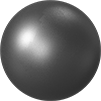Filter by
Compressive Strength
Hardness
Thermal Conductivity @ Temperature
Flexural Strength
Modulus of Elasticity
DFARS Specialty Metals
REACH
RoHS
Export Control Classification Number (ECCN)
About Composites
Compare our offering of composites to find the right material for you.
High-Strength Wear- and Acid-Resistant Sintered Silicon Carbide Ceramic Sheets
Temp. | 3" × 3" | 6" × 6" | |||||||||||||
|---|---|---|---|---|---|---|---|---|---|---|---|---|---|---|---|
Thk. | Thk. Tolerance | Color | Min. | Max., ° F | Fabrication | Performance | Porosity | Compressive Strength, psi | Hardness | Each | Each | ||||
| 1/16" | -0.040" to 0.040" | Black | Not Rated | 2,900 | Sintered | Acid Resistant, Chemical Resistant, High Strength, Wear Resistant | 0% | 565,000 | Rockwell B66 | 00000000 | 0000000 | 00000000 | 0000000 | ||
| 1/8" | -0.040" to 0.040" | Black | Not Rated | 2,900 | Sintered | Acid Resistant, Chemical Resistant, High Strength, Wear Resistant | 0% | 565,000 | Rockwell B66 | 00000000 | 000000 | 00000000 | 000000 | ||
| 3/16" | -0.040" to 0.040" | Black | Not Rated | 2,900 | Sintered | Acid Resistant, Chemical Resistant, High Strength, Wear Resistant | 0% | 565,000 | Rockwell B66 | 00000000 | 000000 | 00000000 | 000000 | ||
| 1/4" | -0.040" to 0.040" | Black | Not Rated | 2,900 | Sintered | Acid Resistant, Chemical Resistant, High Strength, Wear Resistant | 0% | 565,000 | Rockwell B66 | 00000000 | 000000 | 00000000 | 000000 | ||
| 1/2" | -0.040" to 0.040" | Black | Not Rated | 2,900 | Sintered | Acid Resistant, Chemical Resistant, High Strength, Wear Resistant | 0% | 565,000 | Rockwell B66 | 00000000 | 000000 | 00000000 | 000000 | ||
Acid-Resistant Silicon Carbide Ceramic Balls
Temp. | |||||||||||||||
|---|---|---|---|---|---|---|---|---|---|---|---|---|---|---|---|
Dia. | Dia. Tolerance | Color | Min. | Max., ° F | Fabrication | Performance | Dielectric Strength | Porosity | Compressive Strength, psi | Hardness | Pkg. Qty. | Pkg. | |||
| 1/16" | -0.00001" to 0.00001" | Black | Not Rated | 2,550 | Sintered | Acid Resistant, Chemical Resistant | Not Rated | 0.2% | 350,000 | Rockwell C90 | 5 | 0000000 | 000000 | ||
| 1/4" | -0.00001" to 0.00001" | Black | Not Rated | 2,550 | Sintered | Acid Resistant, Chemical Resistant | Not Rated | 0.2% | 350,000 | Rockwell C90 | 5 | 0000000 | 00000 | ||
| 3/8" | -0.00001" to 0.00001" | Black | Not Rated | 2,550 | Sintered | Acid Resistant, Chemical Resistant | Not Rated | 0.2% | 350,000 | Rockwell C90 | 5 | 0000000 | 00000 | ||
High-Strength Wear- and Acid-Resistant Sintered Silicon Carbide Ceramic Rods
 |
Temp. | 12" Lg. | |||||||||||
|---|---|---|---|---|---|---|---|---|---|---|---|---|
Dia. | Color | Min. | Max., ° F | Fabrication | Performance | Porosity | Compressive Strength, psi | Hardness | Each | |||
| 3/8" | Black | Not Rated | 2,900 | Sintered | Acid Resistant, Chemical Resistant, High Strength, Wear Resistant | 0% | 565,000 | Rockwell B66 | 00000000 | 0000000 | ||
| 1/2" | Black | Not Rated | 2,900 | Sintered | Acid Resistant, Chemical Resistant, High Strength, Wear Resistant | 0% | 565,000 | Rockwell B66 | 00000000 | 000000 | ||
| 3/4" | Black | Not Rated | 2,900 | Sintered | Acid Resistant, Chemical Resistant, High Strength, Wear Resistant | 0% | 565,000 | Rockwell B66 | 00000000 | 000000 | ||
| 1" | Black | Not Rated | 2,900 | Sintered | Acid Resistant, Chemical Resistant, High Strength, Wear Resistant | 0% | 565,000 | Rockwell B66 | 00000000 | 000000 | ||
| 1 1/2" | Black | Not Rated | 2,900 | Sintered | Acid Resistant, Chemical Resistant, High Strength, Wear Resistant | 0% | 565,000 | Rockwell B66 | 00000000 | 000000 | ||
| 2" | Black | Not Rated | 2,900 | Sintered | Acid Resistant, Chemical Resistant, High Strength, Wear Resistant | 0% | 565,000 | Rockwell B66 | 00000000 | 000000 | ||


























